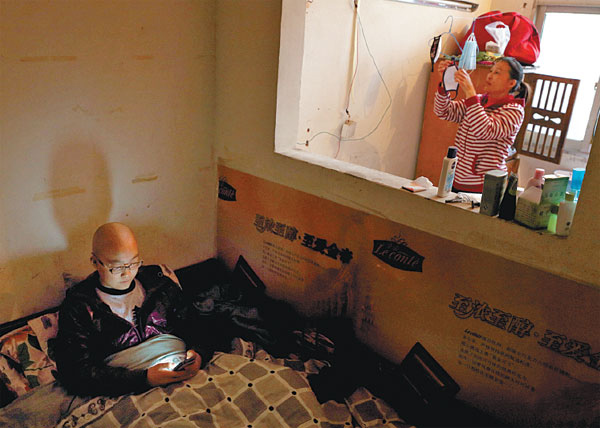

Shao Liangyu, 14, plays a game on a cellphone while his mother hangs up a surgical mask to dry in Wujianong, Hefei, Anhui province. Shao has acute myeloid leukemia. Situated next to the Anhui Provincial Children's Hospital, Wujianong is home to dozens of young cancer patients, most of whom come from rural areas and have to visit the hospital regularly for treatment. Gao Bo / for China Daily
People are abandoning their homes in the countryside and living in squalid conditions in the capital of Anhui province in the hope of giving their children a better chance of surviving cancer.
Dozens of children with life-threatening diseases are living in a 70,000-square-meter slum called Wujianong next to the Anhui Provincial Children's Hospital in Hefei, the capital of Anhui province.
In Wujianong, the crowded and shabby, temporary two-and three-story dwellings, which are likely to be demolished at any moment, block out the sky. Even during the day, lights are needed in the dim, winding passages, but few have been installed.
People habitually refer to places such as this as a "village in the city", but most Chinese villages aren't like this. Wujianong is a real slum.
The residents come from the rural areas. Most are migrant workers who work at nearby factories or construction sites, but a few dozen live in Wujianong because it's convenient for their children's treatment at the hospital. They've left their real homes to try and give their children a better chance of survival.
A cruel reality
About seven months ago, Zhang Yongxin, her husband and son, moved into a rented 10-sq-m room in Wujianong, where they sleep on boards placed across piles of bricks. An old-fashioned wardrobe is the only furniture in the room.
Zhang is in her early 40s. She hails from Fuyang, a city in the north of the province. When her son, Dai Sibo, was born four years ago, Zhang and her husband already had two daughters. The girls have been living with their grandparents in Fuyang since their mother, father, and brother moved to the city,
The boy's birth put even greater financial strain on the impoverished parents, but they were ecstatic with the arrival of their long-awaited son, despite being fined more than 10,000 yuan ($1,600) for violating the national family planning policy.
In some rural parts of China, if the first child of a family is a girl, the couple is allowed to have another child without incurring a penalty. However, a third child violates the family planning policy and results in a fine.
"We were satisfied with life then," Zhang said.
The happiness didn't last long. About seven months ago, when the family was busy harvesting wheat, Zhang noticed the boy was running a fever and his legs were stiff. She took him to a small clinic in the village and was given antipyretics to lower his temperature.
A few days later, the boy got a cold and injured one of his legs while helping with the harvest.
Because Sibo kept crying out, "My leg hurts", Zhang took him to the township hospital, where the doc-tors concluded that he had calcium deficiency. They prescribed some cold medicine, but nothing for his injured leg because there was no visible wound.
Three days later, the boy's leg was still causing him discomfort, so Zhang took him to the hospital at Linquan county. The doctors were unable to help, so they advised Zhang to take the boy to the municipal hospital, where he was diagnosed with my elomonocytic leukemia, an aggressive form of the disease.
Zhang fainted when she heard the diagnosis, which was confirmed by physicians at the Anhui Provincial Children's Hospital.
The story was much the same for Li Shuyi, 5, from Bengbu, and 4-year-old Zhao Xingwang, also from Fuyang-who were both diagnosed with acute lymphoblastic leu-kemia- and for 2-year-old Dai Ziyi from Bozhou who has acute mixed-lineage leukemia.
"We never thought about the possibility of such a bad result, nor did the doctors in the less-developed areas. After talking with other families in the hospital, I found malnutrition or skin diseases were two common diagnoses by the doctors in rural areas at first", said Li Xiao-jing, whose 3-year-old daughter Li Yaqi has ganglioneuroblastoma, a rare type of cancer, but was originally diagnosed with calcium deficiency by doctors in her hometown.
Some of these families are now neighbors in Wujianong, where most of children are 10 or younger, and have leukemia, a cancer that commonly affects children.
The parents are trying to save their children's lives, but for many it seems the best they can do is to save money to pay for treatment, even though they feel as though they are throwing money down a black hole.
Two-thirds of cancer cases due to ‘bad luck‘: study
2015-01-02When patients get caught between cancer and crime
2014-12-24Young women at risk from cervical cancer
2014-12-03Copyright ©1999-2018
Chinanews.com. All rights reserved.
Reproduction in whole or in part without permission is prohibited.